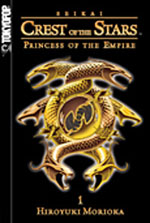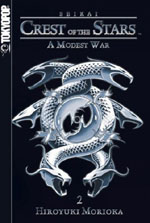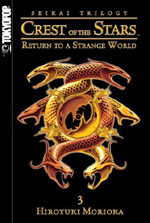 Imagine for a moment that you have been made aware of a novel with a reputation which places it on the same lofty plateau as the Foundation Trilogy, the Lord of the Rings, or Dune. Its author has carefully crafted an entire culture and society, complete with a language so detailed that many have learned to speak it fluently. Its plot is epic in its scope. Its quality is attested to by a legion of dedicated fans, multimedia adaptations, and widespread acclaim.
Imagine for a moment that you have been made aware of a novel with a reputation which places it on the same lofty plateau as the Foundation Trilogy, the Lord of the Rings, or Dune. Its author has carefully crafted an entire culture and society, complete with a language so detailed that many have learned to speak it fluently. Its plot is epic in its scope. Its quality is attested to by a legion of dedicated fans, multimedia adaptations, and widespread acclaim.
In short, it is reputed to be a masterpiece. And you have never read it.
So you go looking for it, but are frustrated to discover that it cannot be had. You are literally unable to discover a single copy of it. But the more you learn about it, the more it sounds exactly like the type of book you want to read.
And then you get some wonderful news: It’s being reprinted! You’ll finally be able to get a copy! Frabjuous day!
So the day finally comes when you hold a copy of the newly reprinted masterpiece in your hands. You crack the cover…
… and discover that the new publishers have decided to not only abridge the book, they’ve also decided to rewrite it as a juvenile.
Imagine, if you will, that you had spent several years searching and hoping to find a copy of the Lord of the Rings or Dune or the Foundation Trilogy. And then, when you thought you finally had a copy, it turned out to be a novelization of the movie which was based on the book.
The emotion you’d be feeling at that moment is roughly akin to the emotion I felt when I finally managed to get my hands on the Crest of the Stars, a space opera masterpiece by Hiroyuki Morioka.
The original novel was written in Japanese. For many years it has been known in English only through the anime and manga adaptations. Starting last year, however, Tokyopop began releasing translated versions of the novel. As is typical for the Japanese market, the book was serialized into three volumes. Tokyopop kept the same format and released it as a trilogy: Princess of the Empire, A Modest War, and Return to a Strange World.
 The novel was translated by Sue Shambaugh. And, unfortunately, the decision was made to release the novel as part of Tokyopop’s juvenile line. The work was minorly abridged, but this was almost a minor sin compared to a translation which fundamentally kiddified the work and stripped out its complexities. The glimmering remannts of Hiroyuki Morioka’s brilliant world-building which shine through in these botched translations is utterly eclipsed by the incessant need to make the characters sound “hip” and “current” (in that utterly artificial way which only a thoroughly dreary adult can achieve when trying to copy “the way kids speak these days”).
The novel was translated by Sue Shambaugh. And, unfortunately, the decision was made to release the novel as part of Tokyopop’s juvenile line. The work was minorly abridged, but this was almost a minor sin compared to a translation which fundamentally kiddified the work and stripped out its complexities. The glimmering remannts of Hiroyuki Morioka’s brilliant world-building which shine through in these botched translations is utterly eclipsed by the incessant need to make the characters sound “hip” and “current” (in that utterly artificial way which only a thoroughly dreary adult can achieve when trying to copy “the way kids speak these days”).
Imagine, if you will, an edition of the Lord of the Rings in which Theoden would say things like: “Fine, spoilsport! Oh jeez! I really don’t want to go fight Saruman’s orcs!”
Perhaps you’d prefer it if Frodo’s hair was described using an analogy to a chocolate pudding pop?
Do you feel the pain?
Then you can imagine my pain.
I’d really love to encourage people to go out and experience this wonderful story. But, realistically, you have to be willing to squint your eyes and try to read between the lines to recreate Hiroyuki Morioka’s masterpiece from the wreckage of Tokyopop’s hamfisted translation.
NITPICKING TOKYOPOP’S EFFORTS
 (1) The first words of Crest of the Stars consist of a quote from a fictional text. This quote begins: “This crest depicts the Gaftonash. The grotesque eight-headed dragon was long lost to the ages — forgotten, alive only in myth. Resurrected on an Imperial crest, the Gaftonash became infamous…”
(1) The first words of Crest of the Stars consist of a quote from a fictional text. This quote begins: “This crest depicts the Gaftonash. The grotesque eight-headed dragon was long lost to the ages — forgotten, alive only in myth. Resurrected on an Imperial crest, the Gaftonash became infamous…”
When you flip open the book to the very first page you’ll discover a large rendition of the Imperial crest described. Count the heads: 1. 2. 3. 4. 5. 6. 7…
Yup. That’s right. The eight-headed Imperial crest has been rendered with only seven heads. This same image is then reused in miniature throughout the volume to break up the text.
You can literally say that Tokyopop screwed it up starting right on page one.
(2) One of the unique things about the original Japanese publication of Crest of the Stars was the way in which Hiroyuki Morioka worked the fictional language of Baronh into the story. As Tokyopop describes it: “In the original Japanese version, all the text is in kanji, and then above those Japanese characters are the Abh language words (called Baronh) in rubi (a smaller, phonetic alphabet).”
Fascinating. How could you duplicate this experience in an English-language edition?
Well, you could duplicate it precisely: Print the book in double-space print and insert the Baronh words on the interleaving lines. This would be awkward, but I’ve got an edition of Caesar’s Gallic Wars that does essentially this (printing a line of Latin and then the matching line in English and using two different colors to make them easily distinguishable).
You could also use footnotes. Or you could put the notes on the facing page (like the Folger’s Library editions of Shakespeare). Or you could consistently put the Baronh words in parantheses.
Or you could do what Tokyopop did: The first time a Baronh term is referenced the English version is written with the Baronh term appearing in parentheses immediately afterwards. So far so good… But then the English term is never used again. Only the Baronh term is used.
This might have worked if only a few select terms had been selected. For example, if the book refers to the “Imperial Emperor (Spunej)”, I’d have a pretty good chance of remembering that Spunej is the Abh title for Emperor.
But it becomes ridiculous when someone talks about taking a shower (guzas), and forever after the word “shower” is never used again. To the extent where you feel like you’re learning key phrases in a foreign tongue, its fun. But when the latter half of the book becomes an increasingly frustrating exercise in referring to the glossary at the back of the book to parse simple sentences, something has gone wrong.
(3) Making the ubiquitous use of Baronh terms even more painful is that, for reasons beyond comprehending, Tokyopop decided to Capitalize Every Single Baronh Word. It makes Everything look like a Proper Noun, and it makes Parsing sentences difficult even When You understand the Baronh Words to begin with.
What makes this even more absurd is that Tokyopop got it right when they used Japanese terms like “kanji” and “rubi” in their foreward: See how I italicized them in the bit I quoted up above? That’s because they’re italicized in the book.
It would have made sense to capitalize titles and ranks (like Spunej) while italicizing common Baronh words (like guzas). It makes no sense to capitalize everything.
Final analysis? I’m glad I finally got a chance to read Crest of the Stars. I’ve been waiting a long time for it.
But I’ll never buy another Tokyopop novel translation.
GRADES:
PRINCESS OF THE EMPIRE: C+ (A)
A MODEST WAR: C+ (A)
RETURN TO A STRANGE WORLD: B- (A)
Hiroyuki Morioka
Published: 2006-2007
Publisher: Tokyopop
Cover Price: $7.99
ISBNs: 1598165755 / 1598165763 / 1598165771
Buy Now!





